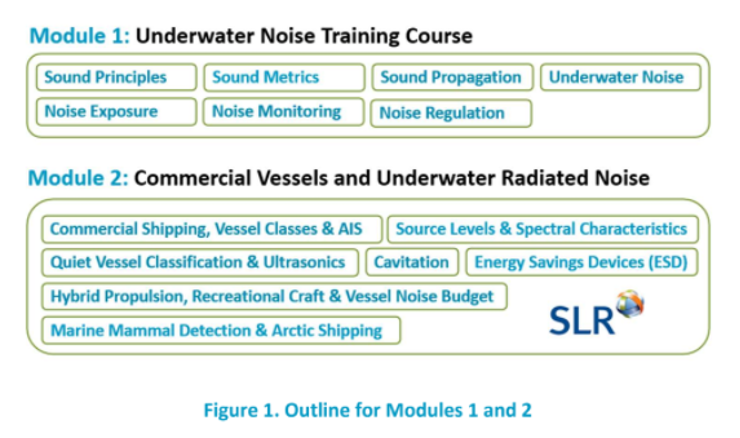Course #3. Underwater radiated noise and commercial vessels CANCELLED
In the maritime and environmental impact assessment sectors, there is a deficiency in directed guidance and supervised training in the fundamental principles of underwater noise and the impacts of commercial shipping. The content of each training module is concentrated on developing knowledge for practical specialists, to increase the understanding of underwater vessel noise and corresponding impacts on the marine environment.
Module one introduces the concept of underwater noise, scales of measurement, impacts on marine biota, and strategies for mitigation. Module two focuses on the history of commercial shipping, vessel types, source-level measurements, quiet ship classification, energy savings devices, and alternative means of propulsion. Upon completion of this training program, participants will be able to interpret the metrics and levels used in underwater noise measurement; identify the components of environmental noise in the ocean, including the noise radiated by commercial vessels; deploy a passive acoustic noise monitoring system, and identify the technology and methodology for impact assessment and mitigation of underwater radiated noise.

Level: Foundation
Prerequisites: None
Language: English
Duration: 2 day (2-3 May)
Price: US$475
Min/Max: 10-19
Requirements: A notepad to take notes. Electronic devices such as tablets or laptops are optional.
Instructor(s): Justin Eickmeier & Jonathan Vallarta
Justin Eickmeier
Dr. Eickmeier (Consulting Scientist) has over ten years of research experience in underwater acoustics, physical oceanography, hydrographic surveying, and ocean instrumentation. He joined SLR in 2019 after completing graduate studies and three years of post-doctoral work at the University of Delaware (UD). Justin's project management experience at SLR includes managing budgets, schedules, reporting deliverables, and invoicing for underwater noise modelling projects. Project management, budget control, and client communication are fundamental skills for consultants given the service-oriented nature of our business. He also provides acoustical technical support for the Enhancing Cetacean Habitat and Observation (ECHO) Program at the Vancouver Fraser Port Authority.
Justin's experience includes an active role in teaching Physical, Chemical, and Biological Oceanography at UD over five semesters. His teaching experience includes lecturing, generating test material, and providing individual and group support for between 50 to 100 undergraduate and graduate students. He has also delivered training sessions on the fundamentals of underwater acoustics and underwater radiated noise from commercial vessels to the Canadian Coast Guard's Whale Desk Program in his role supporting the ECHO project.
Justin's role at UD also included leading and managing UD teams participating in Arctic research cruises as part of large-scale experimental projects, requiring advanced planning and daily coordination with other managers from the various institutions on board. Two large-scale research campaigns that Justin led and managed at UD were the Canadian Basin Acoustic Propagation Experiment (2015-2017) and the Stratified Ocean Dynamics of the Arctic (2018-2019). As UD's field project manager, Justin was responsible for developing and managing the project from initial planning through to final data analysis and reporting. This included cruise planning, budgeting, logistics, (instrumentation, calibration, travel, and deployment) and training team members on their specific roles to perform over the 30 to 40-day expedition.
Jonathan Vallarta
Dr. Vallarta (Principal, Acoustic Consultant) has eighteen years of experience in underwater acoustics in a wide range of positions, including teaching, course design, project management, acoustic consulting, and collaborative research. His expertise is in the design of new configurations for hydrophone arrays and the development of localization algorithms using passive sonar techniques to track the migratory patterns of cetaceans in areas where there is increased anthropogenic activity.
Prior to joining SLR, Jonathan lectured several courses over five years as an associate professor at the Ibero-American University in Mexico City. He also has considerable experience providing training courses in the fundamentals of underwater noise and monitoring techniques. He ran a passive acoustic monitoring (PAM) business, providing introductory training for members of the public, amateurs, and experienced workers in the field of underwater acoustics. Jonathan has hosted acoustic workshops in Canada and Latin America targeting different stakeholders and project-oriented groups. A selection of training workshops delivered by Jonathan included theoretical and practical (hardware and software) training to junior and senior PAM operators that engage in seismic exploration vessels and vertical seismic profiling in offshore operations, as well as training for engineers and scientists focused on ocean research and impacts on marine fauna.
In 2018, his expertise was recognized at the 19th UNICPOLOS meeting as a Mexican advisor and invited panelist on Anthropogenic Underwater Noise at the United Nations headquarters in New York.
